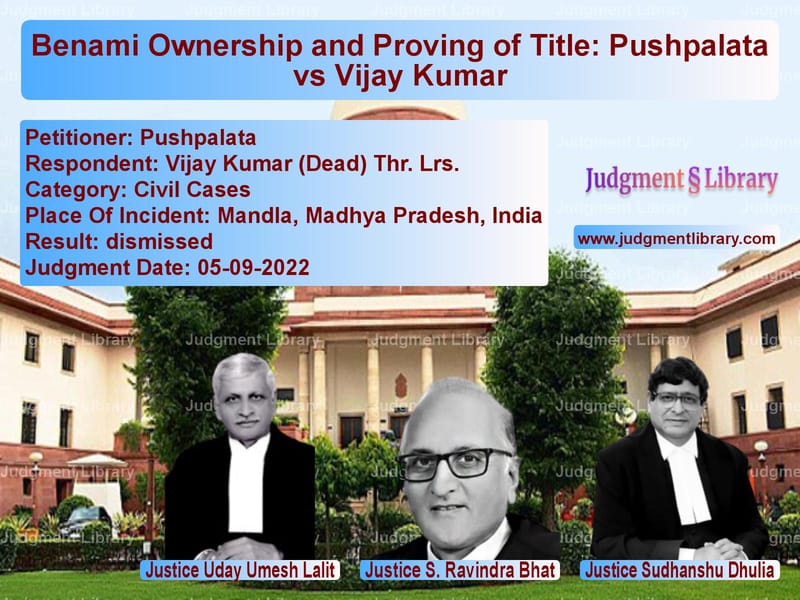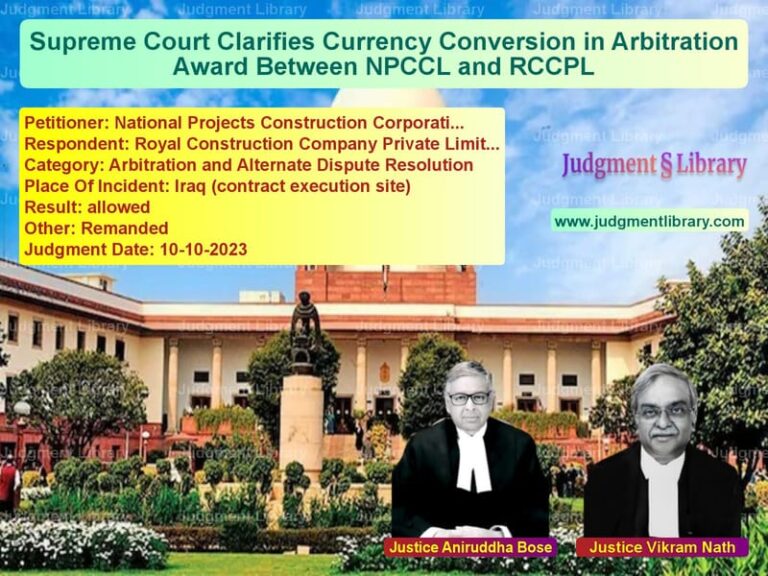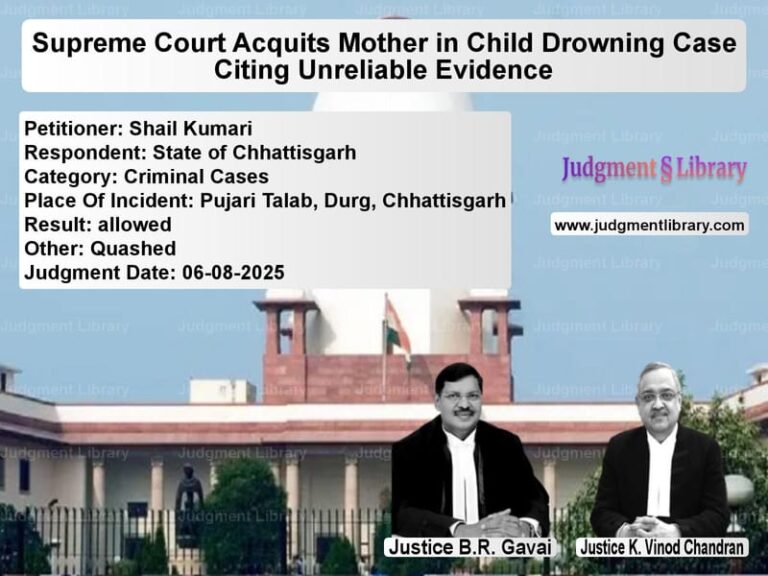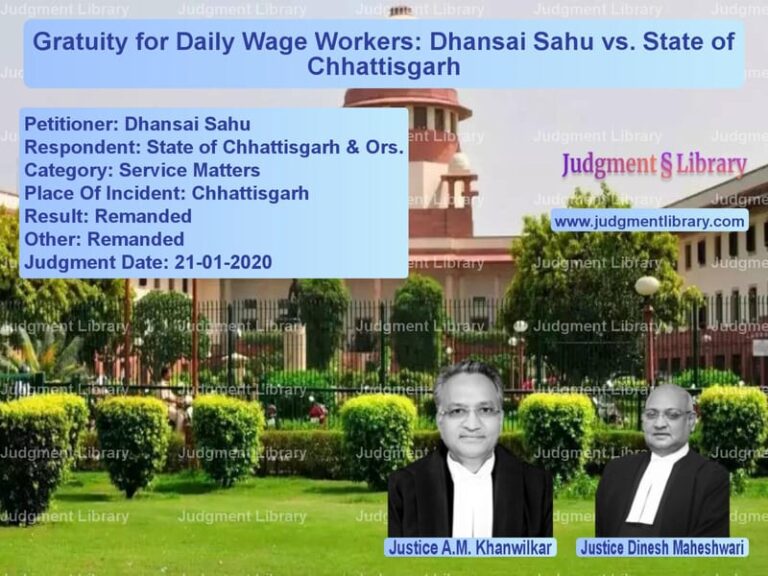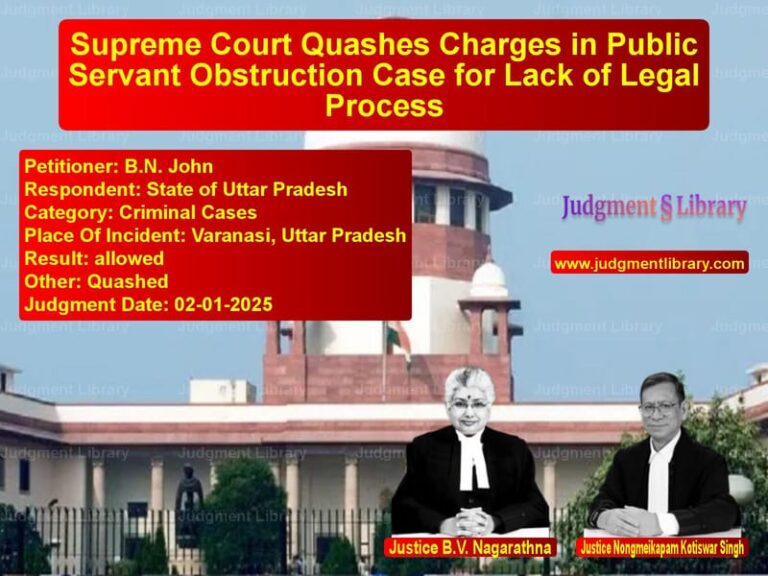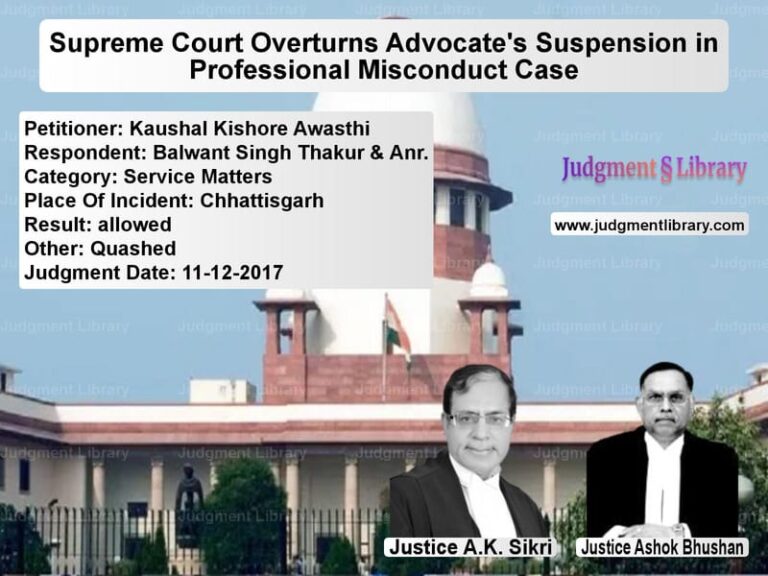Benami Ownership and Proving of Title: Pushpalata vs Vijay Kumar
The case of Pushpalata vs Vijay Kumar centers around the issue of benami transactions and the validity of property ownership. The appellant, Pushpalata, along with other family members, filed a civil suit to seek ownership of certain properties purchased in the name of her son, Vijay Kumar, who had sold part of the property without the consent of the family. The primary issue in this case was whether the property, purchased by the father for the benefit of the Hindu Undivided Family (HUF), was benami, as claimed by the appellant, or whether the sale conducted by Vijay Kumar, who was listed as the owner, was legitimate. The case also dealt with whether the property was purchased for the benefit of the HUF under Section 4(3)(a) of the Benami Transactions (Prohibition) Act, 1988.
Background of the Case
The dispute arose from the properties purchased by Laxmi Prasad, the father of Vijay Kumar and Rajendra Kumar. The father purchased the properties in the name of his sons, both of whom were minors at the time. These properties were intended for the welfare of the HUF and to support the family. However, on May 3, 1994, Vijay Kumar sold part of the property to a third party despite an injunction in place. The family then sought the annulment of the sale deed and a declaration of ownership based on the argument that the properties were benami, i.e., purchased in the name of the sons but for the benefit of the family as a whole.
The trial court and the first appellate court had dismissed the claims, stating that the plaintiffs could not prove the properties were for the benefit of the HUF. The High Court affirmed the decision, further arguing that the suit was barred by the provisions of the Benami Transactions (Prohibition) Act, 1988. The petitioners then approached the Supreme Court.
The Petitioner’s Arguments
The petitioners argued that the property was clearly purchased for the benefit of the family and was registered in the names of the minor sons out of love and affection, not as a benami transaction. They pointed out that Vijay Kumar was a minor at the time of purchase and had no independent means to purchase the property. The petitioners also argued that the sale made by Vijay Kumar was without the consent of the family, and hence, the sale deed should be set aside. The petitioners further stated that the evidence showed that the properties were purchased using funds generated by the family, including earnings from the father’s construction business, and thus should be treated as property held for the benefit of the HUF.
The petitioners emphasized that the first defendant’s actions in selling the property were not authorized and violated the fiduciary responsibility of a family member holding property for the benefit of the family. They also argued that Section 4(3)(a) of the Benami Transactions (Prohibition) Act allowed for the defense of the property being held on behalf of the HUF, and the courts below had erred in not recognizing this exception. The petitioners relied on previous judgments such as Valliammal v. Subramaniam (2004) to argue that the nature of the transaction, the relationship of the parties, and the source of the funds supported their claim.
The Respondent’s Arguments
The respondents, represented by Vijay Kumar, defended the sale on the grounds that the property was legally owned by him and that there was no restriction on his ability to sell it. The respondents argued that the property was purchased in the name of Vijay Kumar and Rajendra Kumar, but there was no evidence to show that the property was intended to be held for the benefit of the HUF. The respondents claimed that the first plaintiff’s attempt to establish a benami transaction was not supported by any valid documentary evidence. They further argued that the suit was barred by the Benami Transactions (Prohibition) Act, which prohibited claims of ownership for properties held in a benami capacity.
The respondents also pointed to the High Court’s decision to reject the suit and emphasized that the courts below had correctly applied the law. They contended that the sale was legitimate and that the petitioners had failed to prove that the property was held for the benefit of the HUF. The respondents further argued that even if the property had been purchased using family funds, it did not automatically imply that the property was benami, and there was no legal obligation to treat it as such.
The Court’s Analysis
The Supreme Court examined the arguments of both parties and considered the relevant legal provisions, especially those under the Benami Transactions (Prohibition) Act. The Court noted that the key issue was whether the property was held for the benefit of the HUF, as claimed by the petitioners, or whether it was legitimately sold by Vijay Kumar. The Court highlighted that the essence of a benami transaction is the intention of the parties, and that the party alleging a benami transaction must prove it with credible evidence.
The Court also referred to its previous decisions in Valliammal v. Subramaniam and other cases, which outlined the factors that could indicate a benami transaction, such as the source of the purchase money and the relationship between the parties involved. The Court emphasized that the burden of proving a benami transaction lies with the person making the allegation, and that this burden must be met with concrete evidence rather than mere speculation.
The Court found that the petitioners had failed to provide sufficient evidence to prove that the property was purchased for the benefit of the HUF. Although the petitioners had argued that the property was bought for the welfare of the family, the Court found that there was no convincing evidence to support this claim. The Court also noted that the respondents had not provided any material to show that the first defendant had the means to purchase the property independently, but the Court concluded that this alone was insufficient to prove the petitioners’ case.
Final Judgment
The Supreme Court dismissed the appeal and upheld the judgment of the High Court. The Court held that the petitioners had failed to establish that the property was purchased for the benefit of the HUF and that the sale made by Vijay Kumar was valid. The Court further ruled that the Benami Transactions (Prohibition) Act applied, and the petitioners could not claim ownership of the property based on a benami transaction without providing sufficient evidence. The Court also observed that the petitioners had failed to prove the essential elements of a benami transaction under the relevant legal provisions.
Read also: https://judgmentlibrary.com/property-dispute-and-criminal-charges-supreme-court-clears-accused/
Significance of the Judgment
This judgment is significant in reinforcing the principles surrounding benami transactions and the burden of proof required to establish such claims. The Court’s decision highlights that the mere assertion of a transaction being benami is not enough; there must be concrete evidence to support such claims. The ruling also clarifies the application of the Benami Transactions (Prohibition) Act, emphasizing the need for clear and convincing evidence when alleging that property is held in a benami capacity. This case serves as a reminder that the legal presumption of ownership must be backed by evidence, particularly in cases involving family properties and HUFs.
Petitioner Name: Pushpalata.Respondent Name: Vijay Kumar (Dead) Thr. Lrs..Judgment By: Justice Uday Umesh Lalit, Justice S. Ravindra Bhat, Justice Sudhanshu Dhulia.Place Of Incident: Mandla, Madhya Pradesh, India.Judgment Date: 05-09-2022.
Don’t miss out on the full details! Download the complete judgment in PDF format below and gain valuable insights instantly!
Download Judgment: pushpalata-vs-vijay-kumar-(dead)-t-supreme-court-of-india-judgment-dated-05-09-2022.pdf
Directly Download Judgment: Directly download this Judgment
See all petitions in Property Disputes
See all petitions in Contract Disputes
See all petitions in Judgment by Uday Umesh Lalit
See all petitions in Judgment by S Ravindra Bhat
See all petitions in Judgment by Sudhanshu Dhulia
See all petitions in dismissed
See all petitions in supreme court of India judgments September 2022
See all petitions in 2022 judgments
See all posts in Civil Cases Category
See all allowed petitions in Civil Cases Category
See all Dismissed petitions in Civil Cases Category
See all partially allowed petitions in Civil Cases Category

